 
|

|

|

|
| |
 |
|
|
While thousands of legal votes in Florida went untallied, only five votes counted in the end: those of the conservative wing of the U.S. Supreme Court, which declared George W. Bush the new president. Rarely has the Supreme Court ever issued such an incompetently argued and plainly political decision, one that blithely ignored the Constitution, Florida law, and the very principles of deference to state autonomy that the far-right justices have fearlessly defended in their years on the bench. Although the Supreme Court's failure to follow the laws doomed Al Gore's chances, the vice president bears the ultimate responsibility for a failed campaign both before and after November 7. Gore lost in the courts for the same reasons he failed to win a majority of the votes on Election Day: Gore's campaign was more concerned about public relations than making serious arguments needed to gain the support for victory. Just as Gore lost the confidence of voters by moving to the center, blindly following the polls and failing to stand with integrity on key political issues, so too did the Gore campaign lose the legal challenge because of its desire to pander to the media. The first mistake was the Gore campaign's obsession with the protest phase rather than the more winnable contest phase, where the broad provisions of Florida law permit the courts to create any remedy deemed necessary. But the Gore lawyers pushed the Florida Supreme Court to extend the protest phase deadline, and lost several days that proved crucial in the end. The second major mistake was sending David Boies, an antitrust lawyer with little experience before the Supreme Court, to argue Gore's case. Boies may have been successful as the face of the Gore campaign in the court of public opinion, but he failed miserably before the highest court. The views of the swing justices were not completely unpredictable. The fact that Justice Antonin Scalia had cited the equal protection argument prominently in his concurrence should have been a hint, and the Gore lawyers must have realized the need to sway Anthony Kennedy or Sandra Day O'Connor. Yet the Gore brief was nothing more than a rehashing of the same old arguments that had already proven so ineffective. Boies could have proposed a resolution for the concerns about the equal protection clause. Instead, Boies actually seemed to strengthen the Bush team's argument that hand recounts were an arbitrary and unfair system demanding judicial intervention. The worst moment in the oral arguments came when Boies, apparently suffering from a bout of temporary insanity, confessed that the vote-counting standards in Florida varied not only from county to county, but "can vary from individual to individual." Ironically, despite all of the conservative complaints about the Florida courts illegally "inventing" new law, in the end the Supremes attacked the judges only for failing to invent enough new law: If the Florida Supreme Court had imposed a specific uniform standard for chad counting, the decision might have gone the other way--or at the very least, the U.S. Supreme Court majority would have been forced to come up with a different excuse to begin the Bush presidency. Boies also failed to make the key point before the court that December 12 was not a compelling legal deadline (he even endorsed the "safe harbor" deadline at one point). The invention of this date as the final deadline was the majority's worst mistake, and proved to be the ultimate undoing of the Gore candidacy. Chief Justice William Rehnquist's argument about "deadline" looked more like a transcript of a call to a psychic hotline than statutory construction: "Surely when the Florida Legislature empowered the courts of the State to grant 'appropriate' relief, it must have meant relief that would have become final by the cut-off date." But Rehnquist did not explain how he intuited why the Florida Legislature would demand to meet this deadline that is unmentioned in state law, even when it would mean breaking the specific state laws requiring a contest phase remedy. Gore's final error was failing to fight this ruling. After all, the majority noted that "a desire for speed is not a general excuse for ignoring equal protection guarantees," and then falsely used lack of time as the excuse to ignore these guarantees in Florida. Instead of conceding, if Gore had convinced the Florida Supreme Court to clarify that December 12 was not the deadline, then O'Connor and Kennedy--who claimed to rely upon the Florida ruling--would have been forced to allow the counting. Boies' incompetence doesn't excuse the willingness of the Supreme Court to ignore the law and precedent in its pursuit of a political victory. And the justices desired a Bush victory so deeply that almost anything Boies said wouldn't have mattered in the end. The Supreme Court waded into the Florida swamp and created a constitutional crisis, when the truth instead might have been discovered, and the law upheld. In a cruel irony, the conservative justices who have been indifferent to the cause of equality actually had the gall to cite cases where the court overturned racist rulings of state courts as a reason not to count these Florida undervotes, which were disproportionately cast by minorities and the poor due to outmoded punchcard voting machines that had an error rate five times that of optical scan machines. Why did these five Republican-appointed justices work so hard to ignore the law and ensure that Bush would become president? It's impossible to ignore the partisan and ideological biases involved. While the Florida Supreme Court would not be affected by the election outcome, the U.S. Supreme Court justices certainly will be. Scalia is hoping to replace Rehnquist as chief justice. The conservatives on the court want Bush appointees who will give them a working majority. Justice John Paul Stevens became unusually personal in his dissent
when he seemed to hint at the court's bias: "Although we may never
know with complete certainty the identity of the winner of this
year's presidential election, the identity of the loser is perfectly
clear. It is the nation's confidence in the judge as an impartial
guardian of the rule of law." Unfortunately when the guardians in
the Supreme Court choose not to obey the rule of law, there is no
one to guard them. John K. Wilson (johnkwilson@postmark.net) is the author of How the Left Can Win Arguments and Influence People: A Tactical Manual for Pragmatic Progressives (NYU Press).
|
